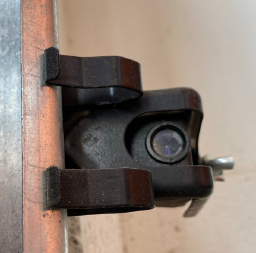Garage Door Sensors: Your Key to a Secure and Safe Home
Garage door sensors are critical safety features designed to prevent accidents by stopping the garage door from closing if an obstruction is detected. This article provides information on the various types of sensors, how they function, and common issues that might affect their operation.
What Are Garage Door Sensors?
Garage door safety sensors are devices that help prevent the door from closing on objects, vehicles, or people. They are a mandatory safety feature on all modern garage doors equipped with an automatic opener. Typically, these sensors use an infrared beam that, if interrupted, triggers the door to stop and reverse direction to avoid accidents.
 If your garage door starts closing and something suddenly blocks the beam, the door will stop closing and start to open again. This prevents your door from closing down on anything in its path.
If your garage door starts closing and something suddenly blocks the beam, the door will stop closing and start to open again. This prevents your door from closing down on anything in its path.
When your garage door closes partially and then unexpectedly opens again, even when no obstructions are blocking the sensor beam, it's a reliable indicator that your garage door sensor is malfunctioning. Occasionally, your garage door might not close properly at all.
Types of Garage Door Sensors
Safety Sensors
Safety sensors work by creating an invisible tripwire using electricity converted into an infrared beam of light. The door requires these beams to have continuous visibility of each other to close, with one sensor transmitting the signal and the other receiving it. Sensors are typically a few inches from the ground to help detect small children, pets, and car tires. If the beam of light is disrupted, the garage door opener will reverse its action and open instead of closing.
Pressure Sensors
Unlike safety sensors, pressure sensors detect resistance when the door starts to close on an object. They then reverse the door's direction to prevent damage or injury. This type of sensor is designed to prevent your door from pressing down on any object or person in the garage door's path.
Carbon Dioxide Sensors
These are less common and are designed to automatically open the garage door if carbon dioxide levels become too high in the garage, ensuring ventilation and safety.
Monitoring Sensors
Monitoring sensors track how long a garage door remains open. They alert homeowners if the door has been left open for an unusually long period, providing an added layer of security.
Common Garage Door Sensor Issues and Solutions
Sensor malfunctions can arise from various issues like signal interference, power supply problems, or dirt and debris buildup. Regular maintenance includes cleaning lenses, checking alignment, and ensuring nothing blocks the sensors. If issues persist, professional help may be required.
Garage door sensors play a vital role in home safety. Understanding their function, regularly checking their performance, and promptly addressing issues helps maintain their effectiveness. For peace of mind, ensure your garage door sensors are always in optimal condition.
Our team of skilled experts recognizes the significance of feeling secure and protected within the confines of your home, which extends to the functionality of your garage door. That's why we provide top-notch services for repairing and replacing garage door sensors.
FAQs About Garage Door Sensors
What should I do if my garage door sensor isn't working? Check for obstructions, clean the sensors, and ensure they are properly aligned. If problems persist, consult a professional.
Can I replace the garage door sensors myself? Yes, if you are handy and follow the manufacturer's instructions carefully. However, for best results, professional installation is recommended.
How often should garage door sensors be tested? Test them monthly by placing an object under the door to see if it reverses. This ensures they are always ready to perform.
Are there universal sensors for all garage doors? Most modern sensors are universal, but always check compatibility with your specific garage door model.
What is the lifespan of garage door sensors? Typically, sensors last as long as the garage door opener, around 10-15 years, but can vary based on usage and maintenance.

